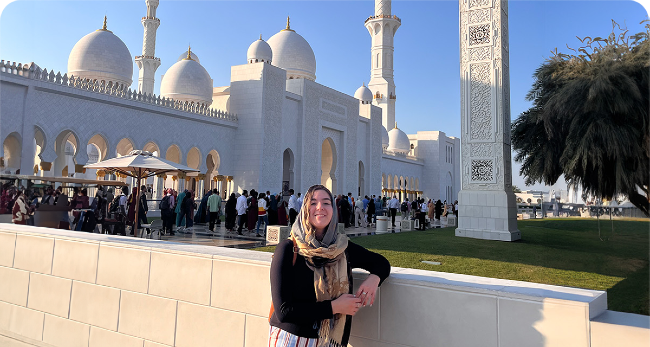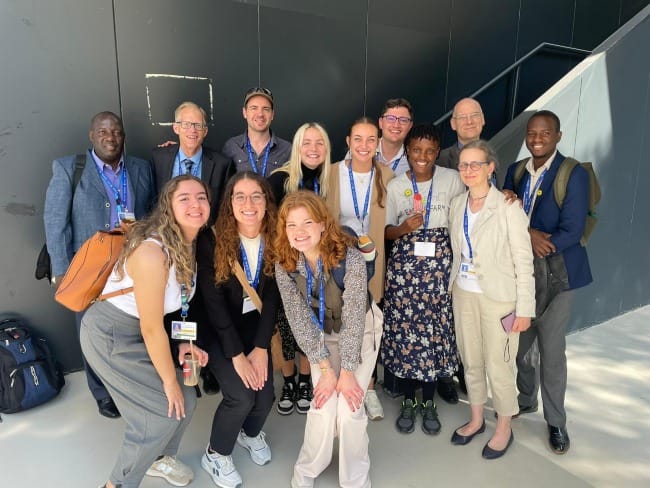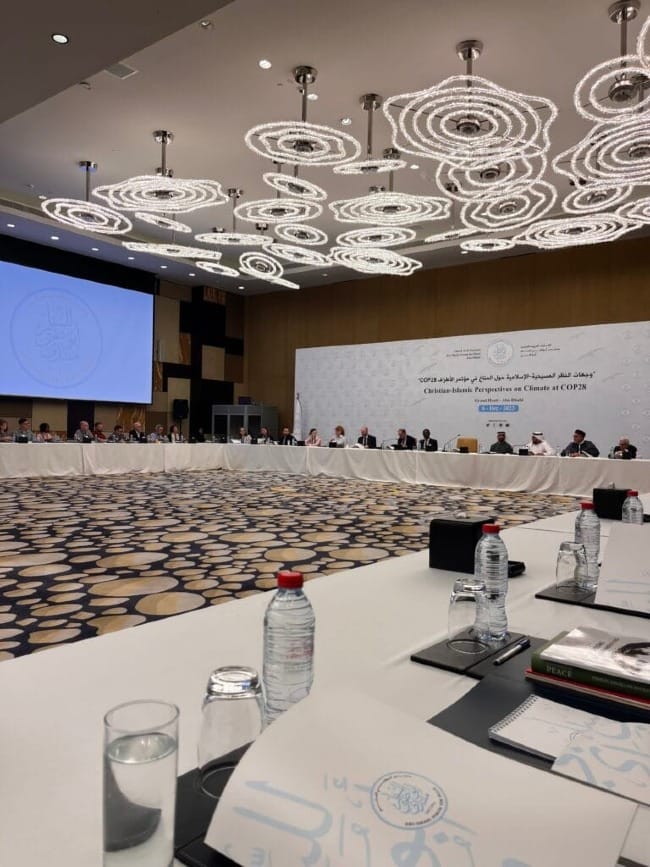In this post, we welcome guest writer, Carolina Franca, a biology student at Gordon College in Boston, Massachusetts. Carolina shares her recent experience at COP28, the United Nations Conference on Climate Change that took place late last year.
As COP28 came to a close in Dubai, I had a hard time putting into a few words what my experience was like. But I have given it a go.

Under the Christian Climate Observers Program (otherwise known as CCOP) I got to embark on what felt like a pilgrimage with around 30 other leaders-in-training through the world of COP. The expectations were high for me, but considering it was my first COP, I honestly did not know what to expect. With 200 countries represented, intense negotiations, side events held by pavilions, and many other interesting groups, being in that environment was nothing short of overwhelming at times.
During those seven days, despite it being overwhelming, what surprised me the most was how much I learned from the conversations I had with people. I got the unique opportunity to put a face to issues that so many people groups suffer from because of climate change. Indigenous tribes in the Amazon are losing their land to deforestation; people in the Pacific Islands such as Fiji or Tuvalu are sinking day by day because of sea level rise, and people in Southeast Asia do not have access to clean water and access to health care. My neighbors. The neighbors that Jesus told us to love in Mark 12:30-31. Before I attended COP28, although I knew of all these problems, it all seemed so distant to me. However, when I talked to these people, everything seemed so tangible to me.

One particular conversation that stuck was with Rev. James Bhagwan, the general secretary of the Pacific Conference of Churches. "See this pin," he said tapping to a small pin on his lanyard that had '1.5ºC' written on it. "This is the difference between life and death for us." Those words were like cold water to my face, a reality check if you will. Our brothers and sisters in Christ depend on these laws to work in their favor, but we let corporate greed, the need for convenience, and self-interest get in the way. "Are we not your neighbors?" the reverend asked us. "Is an American life worth more than a Pacific life?"
Yes, they are our neighbors and, no, their lives do not mean less. We are all equally loved and under the eyes of God, so why do we act as though one is greater than the other simply because of social class, cultural differences, and location? Are we truly loving our neighbors or are we just saying that we do? As Christians, loving your neighbor and caring about climate change are two sides of the same coin. You cannot claim to love your neighbor but not be actively engaging with the climate crisis.
That conversation changed the way I approached practicing the commandments God has given me as a Christian. When I decide that I will start using my car less, eating less meat, or thrift my clothes instead of buying them new, I am actively loving my neighbor because I am doing what I can to live a sustainable life. Not just for my well-being but for the well-being of the planet and the billions of other people who live in it.
It should feel like a responsibility to all Christians.

One of the most profound sessions I heard was one on Exploring Religious Resistance to Climate Action, with many renowned speakers, and among these speakers, one of them was a young climate activist named Vanessa Nakate. When talking about the climate crisis she said, "Climate action is beyond a passion, but it feels more like a responsibility to me." What Nakate said should be true for all Christians, and certainly became true for me. Climate action should feel like a responsibility for all of us, because if we feel that loving our neighbors is a responsibility placed onto us by God, then this includes climate action.
These interactions and conversations that I had at COP28 revealed to me the role that I must play in climate action, the role that all believers should have. We should be actively seeking out ways in which we can help, even if it's in some small way, such as bringing awareness to local churches and making changes in our own daily lives. Indeed, the actions of one person cannot change much. Throughout COP28, I found myself overwhelmed by the scale at which change needs to occur to make a difference, and at times it was discouraging. But what brought me hope is that mindsets can be changed if awareness is spread and there is purpose behind it.
I know now that I should be involved in government jobs, policy making, and I am hoping to make a difference through my work once I graduate. I decided to eat a more plant-based diet, use less plastic, or spend less on unnecessary items so that I lower my carbon footprint. I decided to do these things because I saw the faces of my neighbors who suffer because of the meat industry, plastic fabrication, and consumerism. If I can make even the smallest impact through my job or through my habits, then I would have done something to love my neighbor.
We, as the Church, have been apathetic about the state of God's creation and of His world and to the people living in it. We cannot keep pushing aside the climate crisis as something unconnected with our faith, because the climate crisis is a human rights crisis. There are people who we call our neighbors facing many of the problems that we have caused. If we claim to love our neighbors in the Amazon forests of Brazil, in the Pacific Islands, in Southeast Asia, in Africa, and in other hurting parts of the world, then we should care about the climate and how it is affecting the livelihoods of these people.
It is time to ask ourselves what would Jesus think if he saw the state of our world today. Would he be pleased?
Carolina Franca
Get in touch with Carolina at Carolina.Franca@gordon.edu
You can comment on this post below.